
Gerund or Infinitive (Greyscale + KEY included)
A short grammar guide on the use of GERUND/INFINITIVE and some sentences to practise for pre-intermediate students. Greyscale version and KEY included. Hope you can use it with your sts. Have a nice day. Hugs mada :)
Level: elementary
Age: 12-17
Type: worksheet

Countable or Uncountable? II (2/2)
It�s a worksheet for students to practice the use of countable and uncountable nouns. There�s a short grammar explanation, some examples and activities to practice. I hope you find it useful!
Level: intermediate
Age: 10-17
Type: worksheet

ADJECTIVES OR ADVERBS?
WORKSHEET TO DISTINGUISH BETWEEN ADVERBS AND ADJECTIVE.(PART ONE)
Level: intermediate
Age: 12-17
Type: worksheet

DO OR MAKE - COMPLETE AND MATCH (B&W VERSION INCLUDED)
Second worksheet in a set of three on the verbs "do" and "make". Here students complete the expressions using "do" or "make" and then match them with the pictures. I hope you like it and find it useful. Have a nice evening/day. Hugs!
Level: elementary
Age: 12-14
Type: worksheet

"am - is - are" or "do - does - don�t - doesn�t" (Printable version&KEY included)
A simple ws for elementary students. The sentences are clear. First exercise is a multiple choice and the second one is gap-filling activity. A printable version is available.
Level: elementary
Age: 9-14
Type: worksheet

Simple Present or Present Continuous? - Speaking + Writing very short exchanges
Students work in pairs. They follow the model: asking questions and answering (using the simple Present and the Present Continuous), according to the notes. Then, in the second exercise, they cross the wrong tense out and, finally, they complete the sentences with the right verb tense. KEY Included. Have a good Thursday! Hugs, mena:)))))
Level: elementary
Age: 9-12
Type: worksheet

Some or Any
Hope u find it useful. Thanks a lot for sharing.
Level: elementary
Age: 9-12
Type: worksheet

PRESENT PERFECT TENSE
PRESENT PERFECT WITH ALREADY, YET, JUST, EVER, NEVER
Level: elementary
Age: 10-14
Type: worksheet

"WILL" or "GOING TO"
Read the grammar explanations,study the examples and fill in the blanks with "will" or "going to"
Level: elementary
Age: 8-17
Type: worksheet

There is or There are and food(+ Key)
Look at the rule and the picture to complete the dialogue with there are or there is.
Level: intermediate
Age: 8-14
Type: worksheet

Present Simple or Present Continuous?
Plain exercises to practise the difference between present simple and present continuous. An answer key is provided. Have a great day!
Level: elementary
Age: 10-17
Type: worksheet

Home, Sweet Home � comprehension, rooms of a house and prepositions [4 tasks + tasks suggested] ((2 pages)) ***editable
I created the text to practice prepositions, descriptions, the rooms of a house, reading comprehension. First students read the text and choose the house that corresponds to the description; the second task is to describe the other houses; the third task is a true of false exercise (comprehension) and a grammar exercise � the students fill out usin...
Level: elementary
Age: 12-17
Type: worksheet

Snakes and ladders - kids or beginner adults
you will need dice or a replacement.
You can print the game on A3 paper and play as a class (divide class in maybe 4 or 5 teams)
or you can print the game a few times on an A4 paper and divide class in groups of maybe 4 students who will play within their groups.
This snakes and ladders game is a good revision for elementary students or children...
Level: elementary
Age: 5-17
Type: activity-card

Neither ---nor or Either---or(+ Key)
pupils have to look at the rules then complete the sentences with either--or or neither---nor. After that, they have to match the pictures and the sentences together.
Level: intermediate
Age: 9-14
Type: worksheet

Past Simple or Past Continuous (b&w included)
1) Sts choose the best one. 2) They match the questions with their answers. 3) They make sentences with the correct tense. 4) They make sentneces by using the words given.
Level: elementary
Age: 12-17
Type: worksheet
|

STATE or ACTION VERBS
26 slides. Put the verbs into the correct tenses, present simple or present continuous.
Level: intermediate
Age: 16-100
Format: PowerPoint

Who wants to be a millionaire? Verbs followed by infinitives or gerunds part1
See ppt "Who wants to be a millionaire? Verbs followed by infinitives or gerunds
Level: intermediate
Age: 11-17
Format: PowerPoint

PAST PERFECT SIMPLE OR CONTINUOUS
This PPT is working on the differences between the past perfect simple (I had done) and the past perfect continuous (I had been doing) not always easy for the students. Answer comes up with a click.
Level: intermediate
Age: 14-100
Format: PowerPoint

British English or American English
This presentation includes the examples of differences between British English and American English in such areas: spelling, vocabulary, tenses and prepositions. It is fully editable. I hope it is going to be helpful and that you will enjoy it.
Level: elementary
Age: 13-17
Format: PowerPoint

Infinitive or gerund
They say either the infinitive or the gerund.
Level: intermediate
Age: 11-100
Format: PowerPoint

Timer for Games or Activities
A powerpoint �timer� to use during games or activities.
Level: elementary
Age: 3-17
Format: PowerPoint

Present or Past
To practice verbal tenses
Level: intermediate
Age: 11-17
Format: PowerPoint

QUANTIFIERS
THEORY AND PRACTICE. (17 slides)
Level: intermediate
Age: 11-17
Format: PowerPoint

Gerunds or Infinitives
Clear explanations and nice ppt about the verbs that followed by both Ving and Infinitive. This ppt also gives the use of verbs of perception
Level: intermediate
Age: 14-17
Format: PowerPoint

adjectives: -ed or -ing ?
A simple ppt to clarify the difference between adjectives ending with -ing and adjectives ending with -ed (for example: bored or boring?)
Level: intermediate
Age: 12-17
Format: PowerPoint

PRESENT SIMPLE OR CONTINUOUS
20-slide PPT. Students have to decide whether to put the verbs in brackets into the present simple or the present continuous tense.
Level: intermediate
Age: 10-17
Format: PowerPoint

BRAIN DRAIN OR BRAIN GAIN
BRAIN DRAIN -- BRAIN GAIN --BRAIN EXCHANGE --BRAIN WASTE! i still keep my brain
Level: intermediate
Age: 14-17
Format: PowerPoint

Past tense or used to+infinitive with a castaway
Animated Power Point game(with sounds) with a life story of a castaway. Students practise the usage of past tense and used to+infinitive. The grammar rule is explained at the end of the Power Point.Over 30 slides.
Level: intermediate
Age: 10-17
Format: PowerPoint

Guy Fawkes� Day or Bonfire Night - 5th NOVEMBER
A look at the history of Guy Fawkes and how he became associated with the Gunpowder Plot, the failure of which, has been commemorated in England since 5th November 1605.
Level: elementary
Age: 10-17
Format: PowerPoint

both... and..., either... or..., neither... nor...
A cute presentation of these conjuctions with practice and answers.
Level: intermediate
Age: 9-17
Format: PowerPoint
|
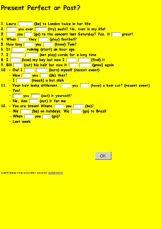
Present Perfect or Past?
Hope you like it!
Level: intermediate
Age: 12-100
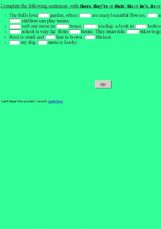
it�s or its, their, there or they�re, his or he�s
This exercice is made to help students make the right choice between confusing words.
Level: intermediate
Age: 10-100
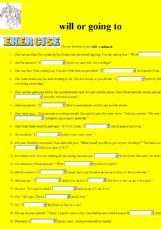
Will or going to
20 sentences will or going to
Level: intermediate
Age: 10-100
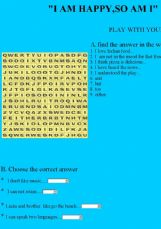
agree or disagree
This is an activity to promote the agree or disagree expressions, in order practice the rejoinders use.
Level: intermediate
Age: 14-14
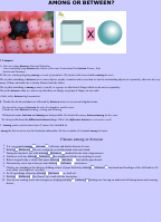
Among or between?
INformation and exercise to contrast "among" amd "between".
Level: advanced
Age: 14-100

AMERICAN vs BRITISH ENGLISH
Two exercises on some differences between American and British English
Level: intermediate
Age: 12-100
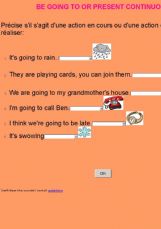
BE GOING TO OR BE V-ING
to revise -ING
Level: intermediate
Age: 9-100

A or An
exercise to reinforce the correct choice between a and an
Level: elementary
Age: 7-100
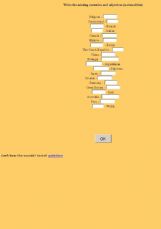
Countries and nationalities
omplete the list with the appropriate adjectives and countries.
Level: elementary
Age: 10-14
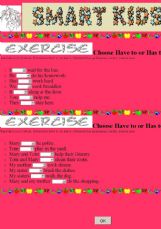
Have to or Has to
2 exercises to help children to learn HAVE to and HAS to
Level: elementary
Age: 6-100

HOW MUCH / HOW MANY - 1
The objective is to help students understand that we can only use "How much" when asking the price.
Level: elementary
Age: 5-10
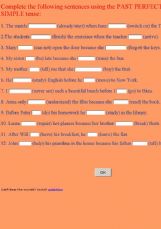
Past perfect or Past simple?
Which is the right tense? Complete the sentences with past perfect or past simple.
Level: intermediate
Age: 6-100
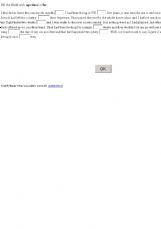
Since For Ago
Fill the blank with Ago, Since or For.
Level: intermediate
Age: 14-100

Ever or never?
Simple exercise to practise EVER and NEVER + present perfect tense.
Level: intermediate
Age: 8-100

a, an, some
Very simple exercise to practise the use of A, AN and SOME with countable and uncountable nouns.
Level: elementary
Age: 5-100
|